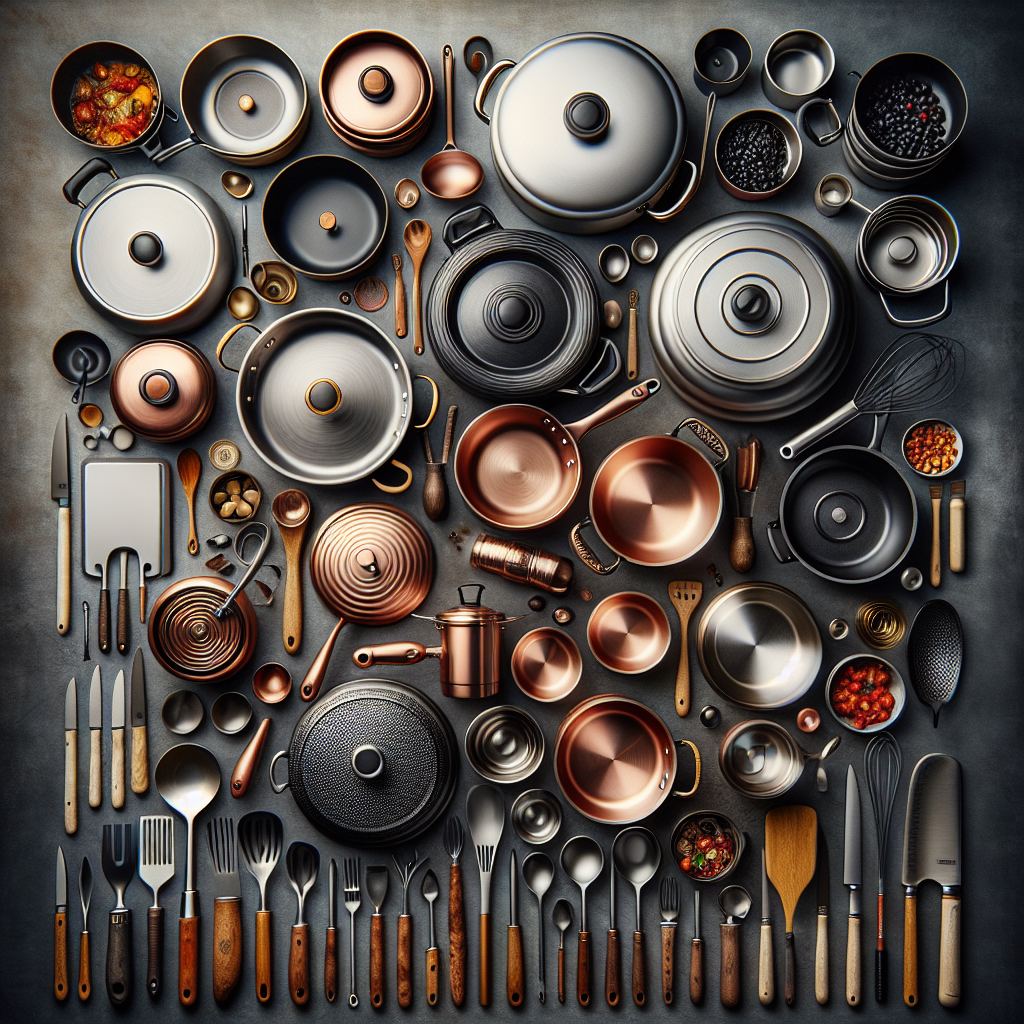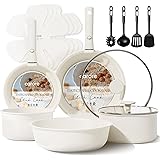Some suggestions to consider!
Astercook 21 Pcs Pots and Pans Non Stick Ceramic Cookware Set, Detachable Handles, RV Kitchen Cooking Set, Oven Safe, Induction Ready, Stackable, Pink
$59.99 (as of February 25, 2026 10:30 GMT +00:00 - More infoProduct prices and availability are accurate as of the date/time indicated and are subject to change. Any price and availability information displayed on [relevant Amazon Site(s), as applicable] at the time of purchase will apply to the purchase of this product.)SENSARTE Ceramic Cookware Sets, Pots and Pans Set Non stick, 14 Piece Induction Cookware, Non toxic Healthy Non Stick Kitchen Cooking Set, with Frying Pans Set, PFAS PTFE PFOA PFOS Free
$79.99 (as of February 25, 2026 10:30 GMT +00:00 - More infoProduct prices and availability are accurate as of the date/time indicated and are subject to change. Any price and availability information displayed on [relevant Amazon Site(s), as applicable] at the time of purchase will apply to the purchase of this product.)CAROTE 17pcs Pots and Pans Set, Nonstick Cookware Set Detachable Handle, Induction Kitchen Cookware Sets Non Stick with Removable Handle, RV Cookware Set, Oven Safe
$49.97 (as of February 25, 2026 10:30 GMT +00:00 - More infoProduct prices and availability are accurate as of the date/time indicated and are subject to change. Any price and availability information displayed on [relevant Amazon Site(s), as applicable] at the time of purchase will apply to the purchase of this product.)
Quality Materials
Understanding Cookware Materials
When I started my cooking journey, one of the most eye-opening things was realizing how much the material of cookware can affect the cooking process. From stainless steel to cast iron, each type of cookware has its own personality, temperature retention, and food reaction properties. Think of it like choosing the right tool for a job; if you have the right material, everything else just falls into place.
For example, stainless steel is fantastic for searing because it conducts heat evenly and doesn’t react with acidic foods. On the other hand, non-stick pans are revolutionaries for anyone who despises cleaning. They make cooking delicate items like eggs a breeze! Knowing what each material does helps me choose the best cookware for whatever culinary adventure I’m up to.
However, I recommend trying cookware made from a mix of materials. I’ve got this one sauté pan that combines stainless steel and copper, and let me tell you, it’s an absolute game changer! You really can get the best of both worlds.
Brand Reputation
Why Reputation Matters
Let’s not kid ourselves: not all cookware brands are created equal! Some have built their name over decades, and I’ve found that they tend to produce more reliable products. You wouldn’t trust a sketchy mechanic to fix your car, right? The same goes for brands! It helps to look for those brands that have stood the test of time and have a loyal following.
For instance, brands like Le Creuset and All-Clad are synonymous with quality. I remember investing in my first Le Creuset pot; it felt like a rite of passage in my cooking. When it comes to cooking, that reliability gives you the confidence to experiment without fear of your gear letting you down.
Don’t be fooled by fancy marketing, either! Sometimes lesser-known brands produce amazing cookware for a fraction of the price. Always check reviews and recommendations from fellow home chefs who’ve been through the trenches just like you—and trust me, your kitchen will thank you!
Versatility
The Importance of Versatile Cookware
In a home kitchen, space can be a luxury! So, I’m all about versatility. I prefer items that can do double duty—like a cast iron skillet that can go from stovetop to oven. I’ll tell you, if something can handle chicken thighs today and a beautiful cornbread tomorrow, that’s a win in my book!
One of my personal favorites? A good Dutch oven. It can simmer, braise, bake, and even serve as a stunning centerpiece on your dining table. It’s like that one friend who’s great at everything; the kind of cookware you just can’t live without!
Plus, versatile cookware lets you explore lots of cuisines. I’ve made everything from gumbo to baked pasta in my Dutch oven, all without needing to swap between a million pots and pans. Saves time, energy, and most importantly, those precious dish-washing minutes!
Price Point
Finding the Balance
Believe me, when I first started cooking, I thought the most expensive items were always the best. But through trial and error, I learned that while you often get what you pay for, there are so many budget-friendly gems out there! It’s crucial to find that sweet spot between price and quality.
I usually plan a budget before purchasing new cookware and stick to it. For example, I invest in good-quality pans that I know I’m going to use all the time and save on lesser-used items. This way, I might splurge on a high-quality chef’s knife while grabbing more affordable non-stick pans.
Also, keep an eye out for sales or second-hand stores. Some of my best finds have been at thrift shops or during holiday sales. High-quality cookware doesn’t have to break the bank if you’re savvy about your choices!
User Experience
Real Life Cooking Scenarios
Nothing beats feedback from fellow cooks! I remember reading countless reviews before selecting my first set of pots and pans. Seeing how they performed in real kitchens made all the difference. Sometimes, the glitzy commercials don’t tell the whole story!
As I immersed myself in cooking, I joined local culinary forums and social media groups. Sharing experiences—both the good and the bad—has helped me tremendously. Most brands nowadays have a social media presence where users can share their cooking adventures.
Also, don’t underestimate the value of demos. Many stores host cooking classes or demos, and it’s a great way to handle the cookware before committing. Trust me, nothing like holding that frying pan and imagining all the perfectly seared meats you could whip up!
Frequently Asked Questions
1. Which cookware brand is the best for beginners?
For beginners, I recommend starting with brands like Cuisinart or T-fal. They provide great quality at affordable prices, making them perfect for those just starting out in the kitchen.
2. Is it worth investing in high-end cookware?
If you enjoy cooking and plan to do it often, high-end cookware can be a great investment. They tend to last longer and perform better, which can enhance your cooking experience.
3. What material is best for everyday cooking?
Stainless steel is a fantastic all-rounder for everyday cooking since it doesn’t react with food and is very durable. Plus, it’s easy to clean!
4. Can I use metal utensils on non-stick cookware?
It’s best to avoid metal utensils on non-stick cookware as they can scratch the coating. Opt for silicone or wooden utensils instead to prolong the life of your non-stick pans.
5. Do I need a different set for gas and electric stoves?
Not necessarily! Most cookware works on both types of stoves. Just ensure your pans have flat bottoms for even heat distribution on electric stoves.
Related Content
- Gotham Steel 12 Pc Ceramic Pots and Pans Set Review
- T-fal Stainless Steel Cookware Set (11-Piece) review
- Cooks-Standard Multi-Ply Clad Stainless-Steel Cookware 9-Piece Silver review
- Essential Guide: What to Look for in High Quality Cookware for Perfect Meals Every Time
- Kitchen Academy Granite Nonstick Cookware Set review



